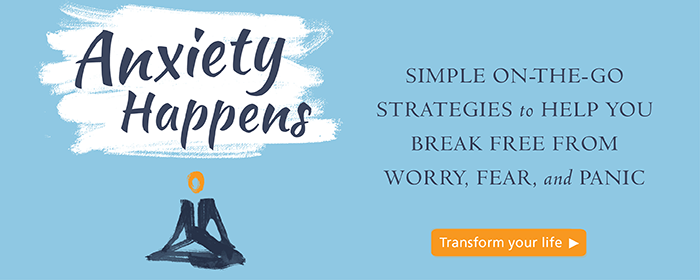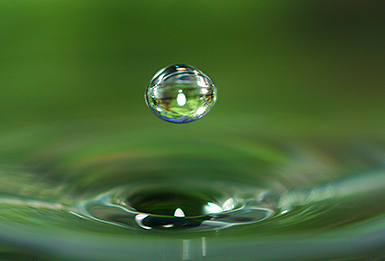Nobody that I have ever know or heard about has ever made a choice to feel anxious, afraid, stressed, depressed, or any one of the countless emotions that we are all capable of feeling. And this includes the pleasant ones too. No one has that kind of emotional "on or off" switch. Emotions happen. They just do. We have little control over them. Heck, if we could control them, then nobody would struggle with anxiety, fear, stress, worry, depression. We'd just flip the switch.
Every single human being on this planet will, at some point in their lives, confront anxiety and fear. There is no escaping this simple truth. But this doesn't mean you have to suffer. It doesn't mean you have to live in fear. You don't have to let anxiety and fear control you!
There are simple and powerful tools you can learn to avoid letting anxiety and fear take over and wreak havoc in your life. We describe many of them in our new book, Anxiety Happens. But the most important tool is this: cultivating a new relationship with your anxious mind and body. This is something you can control.
Anxiety and fear need our active participation to grow and take over our lives. Because they are unpleasant, our natural tendency is to meet them as an uninvited house guest. We fight. We struggle. We resist. We try to cope. We avoid. We run. But this creates new problems. These strategies just tend to make the anxiety worse - bigger, more frightening, and more frequent.
You've probably heard it put this way - what you resist, persists. There's truth in that. Even modern science teaches us that the more you try not to think a thought or feel an unpleasant feeling, the more you will find yourself thinking and feeling the very thing you don't want to think and feel. I know there are plenty of people out there that will promise you ways to control your anxiety and fear. And sure, you might be able to do it here or there. But you have to look long term. Does control really work? Does anxiety and fear stay away for good? If you're like most human beings, the answer is a big "NO."
Wearing my hat as a researcher, I can tell you that your experience is right on. There are plenty of unhealthy ways to stop anxiety, but I do not know of a single healthy way to keep anyone from feeling anxiety and fear. None. Zippo. You might wonder why that is so. Here's a quick and dirty on why control doesn't serve us well with our thoughts and emotions.
In a way, the rules inside our skin work like this - the more you don't want it, the more you've got it. So, when you try not to think about getting anxious on a plane, at a board meeting, on a date, doing something new, or at a party, and so on that thought "I can't get anxious" is itself a thought about being anxious. So you are right back where you started and end up more anxious and afraid.
And we also know that all that energy and attention being poured into getting a handle on anxiety is attention and energy away from what you really care about and the kind of person you wish to become. Everyone has finite resources in terms of where they put their attention and energy. If you pour it into anxiety, you will naturally not be paying attention and engaging other areas of your life that you might care deeply about. There's no life inside fighting a war with anxiety. It pulls so many people out of their lives and creates the worst kind of pain - the pain of an unlived life. So, what can you do?
You decide, perhaps for the first time, to change your relationship with the thoughts your mind feeds you and what your body does. Thoughts and feelings come and go like the weather if you let them. You, the one who can notice all the activity, are like the sky - you were there before the anxiety, and will be there long after.
Because you can notice, you can't be what you think and feel. You already have lots of practice with this in the world around you - you can notice notice people, objects, places, smells, textures, sounds, in the world around you. You can do the same with your thoughts and feelings. If that were not so, there would be no way to look at them. But you can look and take a perspective just as you have done throughout your live.
Let that sink in a bit. It's an important teaching that will help you break free from the traps that anxiety and fear may set for you. Thoughts and feelings come and go, but you - that observer self - are the one constant in your life. And that observer you was there before the anxiety and that observer you will be there long after anxiety flashes in and out of your awareness.
You are the one that can notice the products of your mind and emotional life. With practice, this will give you the space you need to make some profound changes.
You can learn to meet the negative emotional energy packed inside anxiety and fear more kindly and in a gentle, less engaged way. This, we know, can have a powerful positive effect on the lives of many. And, it can give you the space, energy, and resources to do something else with your life other than fighting a war with your anxious mind and body.
The idea is simple, but it takes practice. In Anxiety Happens, we describe simple teachings and powerful tools and exercises to help you get the space you need to suffer less when anxiety strikes and help you keep moving forward to live your life in ways that matter to you.
Everyone, at one point or another, gets derailed by anxiety and fear. If that applies to you, then you're in good company. I've had my fair share of derailments. And I've struggled too. But I have learned over the years that I have the power to control what I do with anxiety and fear when it shows up. And this doesn't mean I like it. I'm not asking you or anyone to like it either.
But when anxiety happens, see if you can relate with your emotional life much like you would a person, pet, or object that you care about and love. If your anxiety were that person, how would you respond?
Would you be harsh and try to push them out of your life?
Or would you be kind, gentle, friendly?
Many of us can think of at least one person that we love. But this doesn't mean we like everything this person does. Maybe we can learn to do the same with our anxieties and fears. And who knows, maybe this will give you some wiggle room to thrive and engage your life in ways that seemed utterly impossible until now.
You'll find teachings, tools, and strategies for navigating anxiety and fear in our latest book Anxiety Happens - 52 Ways to Find Peace of Mind. It just came out in April 2018 and you can find it on Amazon, Barnes & Noble, and most places where books are sold (including Hudson News shops in airports across the United States.
If you do happen to read the book, please let us know what you think by writing a few words on Amazon. I would never ask you to just write a glowing review. Listen to your gut and follow your heart. But I would love to hear what you think.
Anxiety happens to everyone. You are never alone in this. It is a powerful, unnerving experience at times. It can create ruin and needless extra suffering in our lives if we give it that power. But, as I said, it doesn't have to be that way. In Anxiety Happens we learn that we have the power to disarm anxiety and fear and reclaim the power to create the space we need to keep moving forward in our lives, regardless of our emotional weather. There is freedom in that.
With Gratitude,
~ John
Dr. John P. Forsyth, is a Professor of Psychology and Director of the Anxiety Disorders Research Program at the University at Albany, NY. He is also a widely sought after speak and author of Anxiety Happens and The Mindfulness & Acceptance Workbook for Anxiety, 2nd ed, among others.

 RSS Feed
RSS Feed
